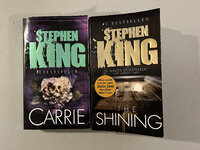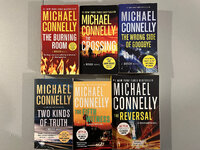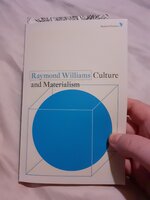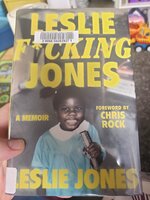November 2023
Book 51: Autumn - Ali Smith

I absolutely loved this, what a book. The story tells of friendship between a young girl (now a woman) and an old man (now a 101 year old bed-ridden chap). Looking back and forth between their shared history through to a today that has just seen the vote to leave the European Union pass, in a country that is as divided as maybe never before. Sub-histories of Pauline Boty, the only female British pop-artist and Christine Keeler, the woman who broke a government are integrated seamlessly into the narrative. It's wonderfully written and deeply emotional at times. I'd planned to read each of this series during the corresponding seasons and I think I'll stick to that but, I really had to fight the urge to dive straight into Winter.
Book 52: Lincoln in the Bardo - George Saunders
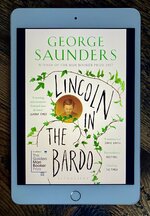
What a wild ride this is. Incomparable to anything I've ever read - it's undeniably a novel but, the form is so different, the chapters made up solely of either quotes from previous non-fiction texts or from characters existing in the bardo, each one complete with citation. It's funny and absurd at times, but it is also, without a doubt, one of the most moving depictions of fatherly grief following the loss of a child I've ever read. Truly wonderful, worthy of all the praise and prizes and would recommend to anyone.
Book 53: Nobody's Fool - Richard Russo

Lovely, full of heart, warm tale of small-town America and the cast of characters that fill it. Led by Sully, a 60 year old hard-grafting, hard-drinking, permanently ill-at-luck (although my assessment is more that of a consumate bad-decision maker), who trundles through this stage of life dealing with a bad knee, bad insurance cover and a life-long resentment of his dead father. Nothing much happens but, that's alright. This is a story more about people than any grand plot. It's my second Russo after
Empire Falls and I'm definitely a fan. He's like a Franzen-lite and I mean that with no disrespect at all. He writes about similar people doing similar things but, there just feels like there's a little more joy with a little less complication and fewer bookish intellectuals than in Franzen's world. I've room for both in my life.
Book 54: Lanark - Alasdair Gray

Well, I thought I was heading for a 100% 5-star month but, I found this one a little bit too difficult to say I fully enjoyed, appreciated, understood it even. Where I found Saunders' take on the experimental novel a joy to get to grips with and enjoy, this one which flits between time and space at a whim; delivers the text in a Book Three, One, Two, Four sequence; and gives characters and locations different names at different times was heavy-going. Essentially, it's two books about two different but the same cities, Glasgow and Unthank and two different but the same lead characters, Thaw and Lanark. It's big and complex and if I had the time in my life to read it a second time, I dare say I'd enjoy it more having revelations towards the end (in a prologue that appears before the last three chapters!) that allow earlier sections to make more sense. It wasn't wholly a dud - far from it. There's a wit, wisdom, vast knowledge and reference to past literature, and the central Thaw novel set in Glasgow of Books One and Two were an excellent portrayal of the artist as a young man and his descent into madness. The surrounding Books Three and Four however, were a bit too fantasy/sci-fi for my tastes. It reminded me in parts of Vonnegut's absurdities (who is referenced in the book), and sections of Infinite Jest and Piranisi too. To say I'm glad I finished it but, maybe wish I hadn't started it would probably be unfair because there's a lot here I did enjoy. I just found it a challenge at times but, still an impressive four star novel for me.
Book 55: Lolita - Vladimir Nabokov

Definitely back in five star territory. This book is so rich in both style and storytelling. Every sentence seems brimming with information and with a flourish in a second language that puts this native English speaker to shame. Nabokov shows his characters in the way they speak, their movements and disposition, their names even, never outwardly telling us but, creating a fully formed being to those prepared to pay full attention. And attention has to be paid, I found. There is so much here that even going back and rescanning sentences that I initially found difficult would indeed reveal more but also demand a third and sometimes fourth scan to make the most of it. I don't often find myself doing this with books preferring to simply take the words at face value but this book felt like it deserved more of a focussed read. And then there's the story which is difficult to say the least. Over the years, I've only heard the term 'Lolita' used to describe a young girl who would use her sexuality to seduce, to lead an older man astray. Remarkable that we've allowed victim-blaming of our most vulnerable to even cloud our language. Nabokov's Lolita is a victim of cruel and consistent abuse, molestation, rape by a self-confessed paedophile who uses his charm and good looks to enter her life and even marry her mother to be closer to her. He drugs her, he bribes her with small amounts of money or material goods then threatens her with losing that lifestyle if she were to tell. How the 4 or 5 year story unfolds from a prison cell is unbelievably clever from the faux-introduction to the afterword. My first Nabokov but there will have to be more.
Book 56: The Lost Estate (Le Grand Meaulnes) - Henri Alain-Fournier

This one was OK, nothing that made me consider it a masterpiece as I'd read many refer to it as. A teenage boy narrates a tale of his titular friend, Meaulnes, who got lost one day and stumbled on a great estate. There, a party was being held for an engagement that fell through. While there he fell for a pretty girl, the sister of the fiancé-that-never-was. Eventually finding his way home, he resumed his school-life, but vows to return to the estate in order to make a go of it with the pretty girl. Sadly, he can never find the lost estate. Later, a troublesome gypsy arrives in their village who turns out to be the jilted fiancé from the estate party, now a troubled young man. The story progresses with a series of coincidental meetings and events that are just too contrived resulting in tragedy for some, and delight for others. I'm told it's widely read in French schools and perhaps it is better appreciated by more youthful readers. Its compactness was a saving grace.



